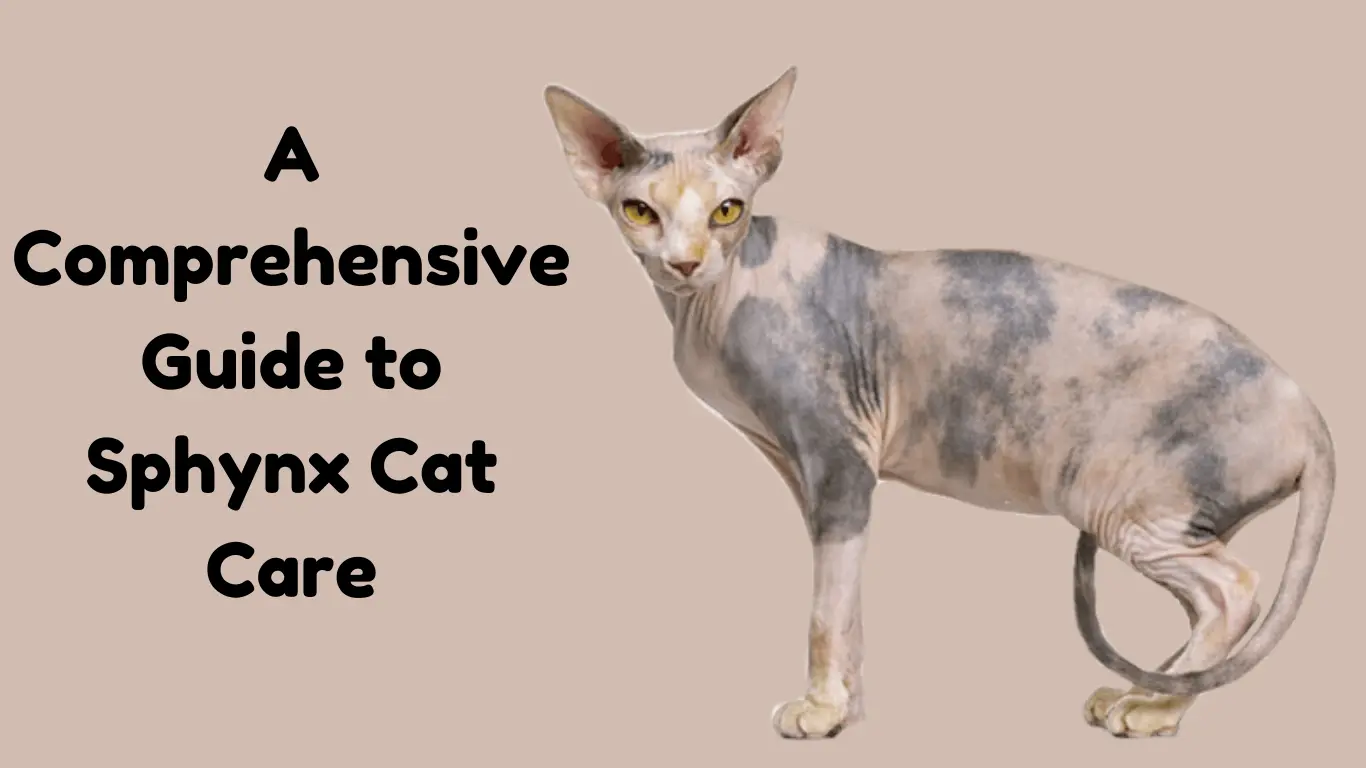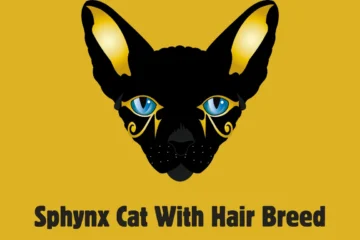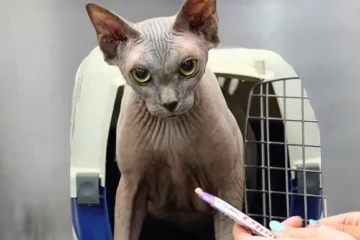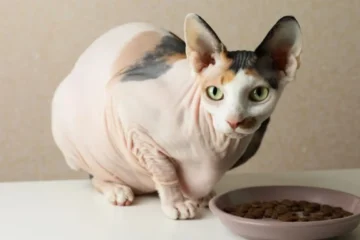Sphynx cats are a fascinating breed, beloved for their hairless bodies, big personalities, and affectionate nature. But their unique characteristics also mean they require specialized care. Whether you’re a new Sphynx cat owner or just considering bringing one into your home, understanding their specific needs is crucial to ensure they live a healthy, happy life. This guide will walk you through everything you need to know about caring for a Sphynx cat, from their unique physical and behavioral traits to their dietary requirements and grooming needs.
Sphynx Cat Characteristics
Physical Traits of Sphynx Cats
The most striking feature of a Sphynx cat is its hairlessness, but there’s more to this breed than just its lack of fur. Sphynx cats have a unique body temperature, often feeling warmer to the touch than other cats due to their lack of insulation. This heat is maintained by a higher metabolic rate, which means they also have higher energy requirements. Their skin, which is often wrinkled, requires special attention as it tends to accumulate oils and dirt more than the fur of other cats. There are also many misconceptions about Sphynx cats due to their unique appearance, which you can explore further in this article on Common Sphynx Cat Myth.
Behavioral Traits of Sphynx Cats
Sphynx cats are known for their affectionate and social nature. They are not the type to hide under the bed but instead prefer to be in the middle of the action, often following their owners around the house. This breed is highly energetic, intelligent, and curious, which means they need plenty of mental and physical stimulation to stay happy. They are also known to be quite vocal, using a range of sounds to communicate with their humans.
Essential Health Care for Sphynx Cats
Skin Care
Since Sphynx cats don’t have fur, their skin requires regular maintenance to stay healthy. Bathing your Sphynx cat weekly is essential to remove the buildup of oils and dirt that can cause skin irritation or infections. Using a gentle, moisturizing shampoo can help keep their skin hydrated. It’s also crucial to dry them thoroughly after a bath, especially in the folds of their skin, to prevent any moisture from causing infections.
Ear and Eye Care
Due to their large, open ears, Sphynx cats are prone to earwax buildup, which can lead to infections if not cleaned regularly. A gentle ear cleaning solution should be used weekly. Their eyes, lacking the protection of lashes, may also need regular wiping with a soft cloth to remove any discharge and prevent infections.
Dental Health
Dental care is another critical aspect of Sphynx cat care. Like all cats, Sphynx cats can develop dental issues if their teeth are not regularly brushed. Using a cat-specific toothbrush and toothpaste, aim to brush their teeth several times a week to prevent tartar buildup and gum disease.
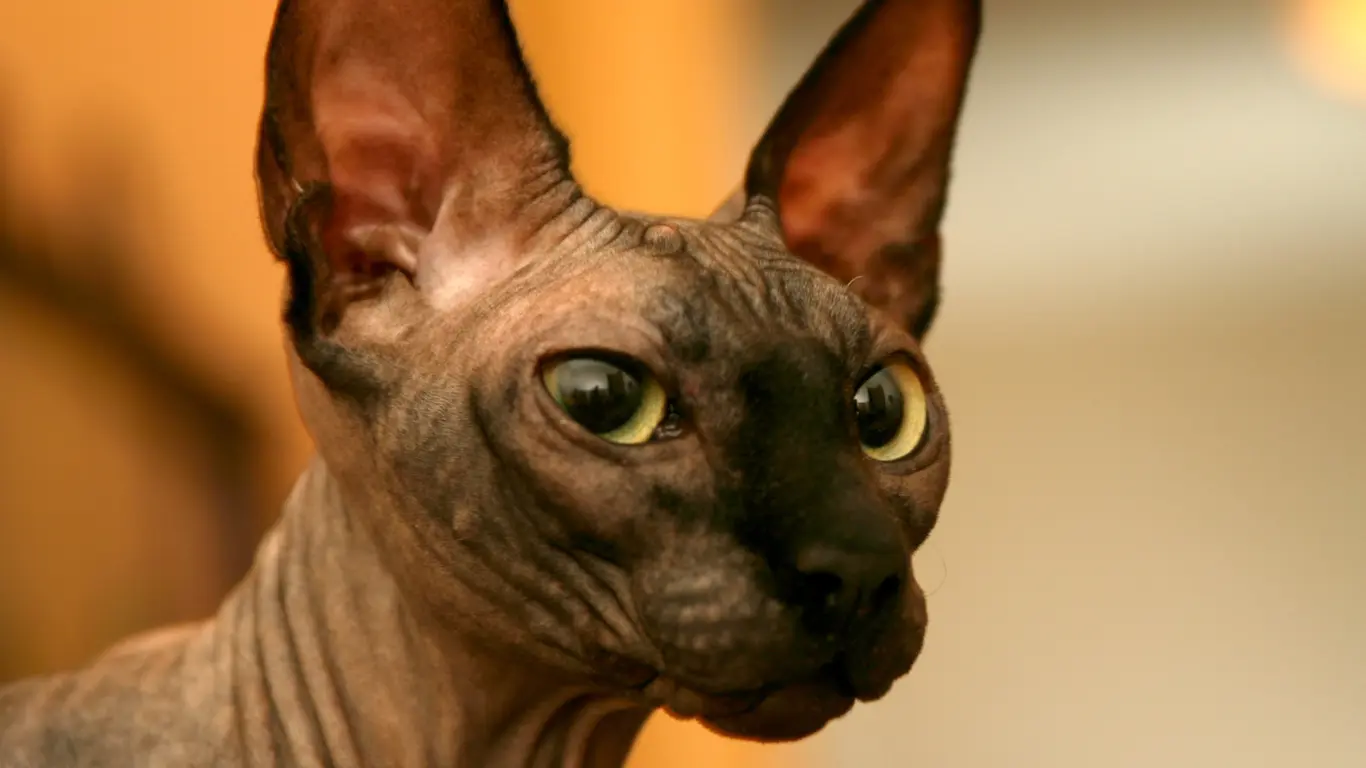
Common Health Issues in Sphynx Cats
While Sphynx cats are generally healthy, they are prone to specific health issues, such as Hypertrophic Cardiomyopathy (HCM), a common heart condition in this breed. Regular vet visits and heart screenings are essential for early detection and management. Additionally, their skin can be susceptible to infections, so monitoring for any unusual redness, bumps, or sores is important.
Regular Vet Visits and Vaccinations
Routine vet visits are vital for keeping your Sphynx cat healthy. Your vet will ensure that your cat is up-to-date on vaccinations and will perform regular health checks to catch any potential issues early. Sphynx cats should be vaccinated against common feline diseases, just like any other cat breed.
Nutrition and Diet
Dietary Needs of Sphynx Cats
Given their high metabolic rate, Sphynx cats require a diet rich in calories to maintain their body heat and energy levels. A balanced diet with the right mix of protein, fat, and carbohydrates is crucial. It’s important to choose high-quality cat food that meets their nutritional needs, avoiding fillers and artificial ingredients.
Recommended Cat Food Types
Sphynx cats can thrive on both wet and dry food, but many owners prefer wet food for its hydration benefits and higher protein content. Grain-free diets are also popular among Sphynx cat owners, as they tend to be easier on the stomach. Some owners even opt for a raw diet, but this should be done with caution and under the guidance of a vet or a pet nutritionist.
Feeding Schedule and Portion Control
Sphynx cats should be fed multiple times a day to keep their energy levels stable. However, portion control is essential to prevent obesity, a common issue due to their high-calorie diet. Monitor their weight regularly and adjust feeding amounts as needed.
Grooming and Maintenance
Bathing Your Sphynx Cat
Bathing a Sphynx cat is a regular part of their grooming routine. Here’s how to do it:
- Gather Supplies: You’ll need a gentle cat shampoo, a soft cloth, and a towel.
- Prepare the Bath: Fill the tub or sink with warm water, not too hot or cold.
- Wet the Cat: Gently wet your cat, avoiding getting water in their ears.
- Apply Shampoo: Lather the shampoo and massage it into the skin, paying attention to the folds.
- Rinse Thoroughly: Make sure all the shampoo is rinsed off to avoid skin irritation.
- Dry Your Cat: Use a soft towel to dry them, ensuring all moisture is absorbed, especially in the skin folds.
Nail Trimming and Paw Care
Regular nail trimming is essential to prevent overgrowth and potential injury. Use cat-specific nail clippers and trim the nails every few weeks, being careful not to cut too close to the quick. Additionally, keeping your Sphynx cat’s paws clean is important, especially if they use a litter box, as dirt can easily get trapped between their toes.
Managing Environmental Factors
Because they lack fur, Sphynx cats are more susceptible to sunburn and cold. If your cat spends time in the sun, use a pet-safe sunscreen, or keep them in shaded areas. During colder months, provide warm clothing or heated beds to keep them comfortable.
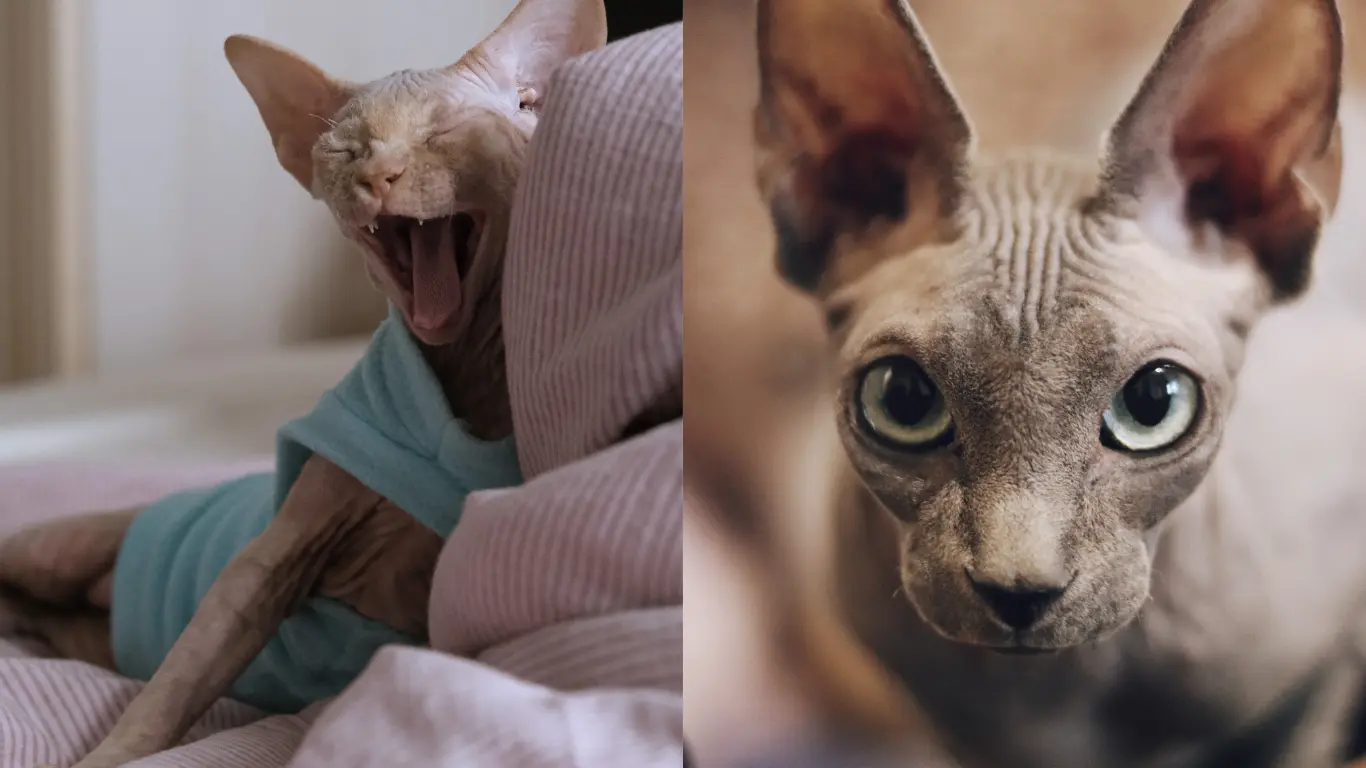
Creating a Comfortable Living Environment
Ideal Home Setup for Sphynx Cats
Sphynx cats thrive in a warm, cozy environment. They love soft blankets and heated beds where they can snuggle up. Providing plenty of comfortable spots around the house is key to keeping them happy. Additionally, they need safe, engaging play areas to burn off their high energy levels.
Choosing the Right Litter Box and Litter
Sphynx cats are particular about their litter box hygiene. Choose a box that is easy for them to access and clean regularly. As for litter, many Sphynx owners prefer unscented, clumping litter that is gentle on their skin and paws.
Providing Mental and Physical Stimulation
Given their intelligence and curiosity, Sphynx cats need plenty of mental and physical stimulation. Interactive toys, puzzle feeders, and regular play sessions are great ways to keep them entertained and mentally sharp. Social interaction with their human companions is also crucial for their emotional well-being.
Training and Socialization
Basic Training Techniques
Training a Sphynx cat is relatively easy due to their intelligence and desire to please. Start with basic commands like “sit” and “come,” using positive reinforcement such as treats or praise. Litter box training is usually straightforward, as Sphynx cats are naturally clean animals.
Socializing Your Sphynx Cat
Early socialization is important for a well-adjusted Sphynx cat. Introduce them to other pets gradually, ensuring positive interactions. Sphynx cats can suffer from separation anxiety, so it’s important to ensure they are comfortable being alone for short periods.
Understanding the Emotional Needs of Sphynx Cats
Building a Strong Bond with Your Cat
Sphynx cats are known for forming strong bonds with their owners. Daily interaction, including playtime and cuddling, helps strengthen this bond. These cats are very affectionate and thrive on attention, so make sure to spend quality time with them every day.
Addressing Behavioral Issues
Like all cats, Sphynx cats can develop behavioral issues if their needs aren’t met. Common problems include aggression, anxiety, or excessive vocalization. Addressing these issues often involves increasing interaction, providing more stimulation, or consulting a vet for advice on managing stress.
Traveling with Your Sphynx Cat
Preparing for Travel
Traveling with a Sphynx cat requires careful preparation. You’ll need a sturdy, well-ventilated carrier, familiar bedding, and some of their favorite toys to keep them comfortable. It’s also a good idea to acclimate your cat to the carrier well before the trip to reduce stress.
Tips for Stress-Free Trips
During travel, keep your cat calm by maintaining a quiet environment and offering comfort through gentle touches or familiar objects. For long trips, make sure to plan for breaks where your cat can stretch and use the litter box. Always have a plan for managing your cat’s needs during layovers or delays.
Understanding the Lifespan and Aging of Sphynx Cats
What to Expect as Your Sphynx Cat Ages
As your Sphynx cat grows older, you’ll notice changes in their behavior and health needs. Senior Sphynx cats may become less active and more prone to health issues, such as joint problems or decreased vision. It’s important to adapt their care routine to accommodate these changes.
Providing Care for Senior Sphynx Cats
Caring for a senior Sphynx cat involves adjusting their diet to lower-calorie foods, maintaining a moderate level of exercise to keep their joints healthy, and scheduling more frequent vet visits to monitor their health. Comfort becomes even more important, so ensure they have soft, warm places to rest.
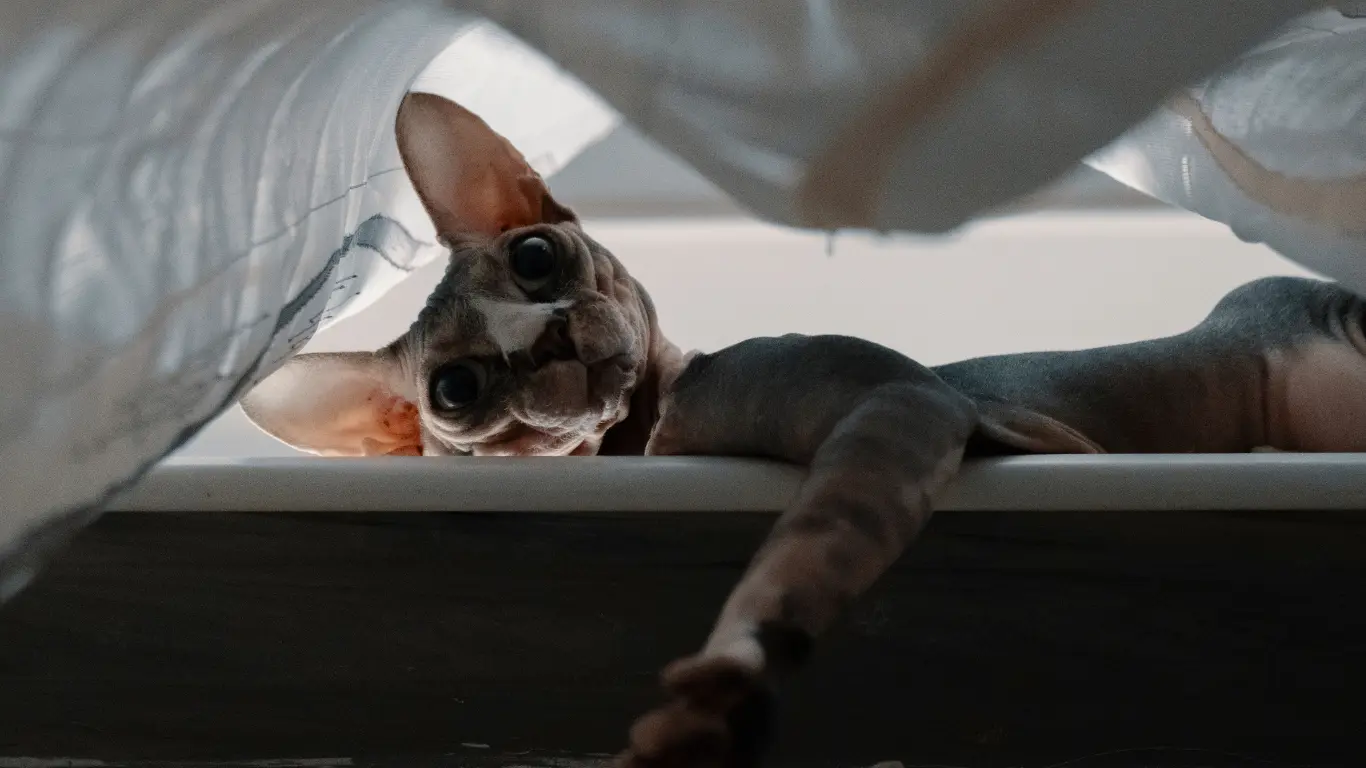
The Financial Aspects of Sphynx Cat Care
Initial Costs of Owning a Sphynx Cat
Owning a Sphynx cat can be a financial commitment. The initial cost includes the purchase price, which can be quite high, and the setup costs, including a bed, litter box, grooming supplies, and the first vet visits. It’s important to budget for these expenses before bringing a Sphynx cat home.
Ongoing Expenses
The ongoing costs of owning a Sphynx cat include high-quality food, grooming supplies, regular vet visits, and potential health issues. Additionally, it’s wise to consider pet insurance to help cover unexpected medical expenses, which can be higher for this breed due to their specific health needs.
Ethical Considerations of Owning a Sphynx Cat
Understanding Breeding Practices
When considering purchasing a Sphynx cat, it’s essential to choose a reputable breeder who prioritizes the health and well-being of their cats. Avoid breeders who engage in unethical practices, such as overbreeding or neglecting proper health screenings.
Rescue and Adoption Options
Adopting a Sphynx cat from a rescue or shelter is a wonderful alternative to purchasing from a breeder. However, it’s important to be prepared for any special needs that a rescue cat might have, especially if they have been through trauma or have health issues.
Frequently Asked Questions
Are Sphynx Cats Hypoallergenic?
While Sphynx cats are often considered hypoallergenic, they can still produce dander and allergens. Some people with allergies may react to them.
What Should I Feed My Sphynx Cat?
A high-calorie, balanced diet that includes plenty of protein is best for Sphynx cats. Wet food is often recommended for its hydration benefits.
Do Sphynx Cats Get Along with Other Pets?
Yes, Sphynx cats are generally social and can get along well with other pets if properly introduced.
How Can I Prevent My Sphynx Cat from Getting Cold?
Provide warm clothing, heated beds, and cozy blankets, especially during colder months, to keep your Sphynx cat warm.
Conclusion
Caring for a Sphynx cat is a rewarding experience that requires dedication and attention to detail. From their unique skin care needs to their high energy levels, Sphynx cats demand a little extra care, but the love and companionship they offer in return make it all worthwhile.
Owning a Sphynx cat is a significant commitment, but it’s also an incredibly rewarding one. By understanding their needs and providing the right care, you can ensure that your Sphynx cat enjoys a healthy, happy life. If you’re considering bringing a Sphynx cat into your home, or already have one, use this guide as a resource to help you navigate the joys and challenges of Sphynx cat care.

